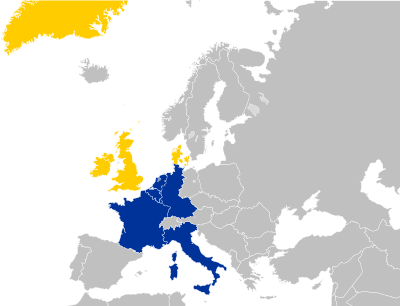
Search
1973 enlargement of the European Communities

The 1973 enlargement of the European Communities was the first enlargement of the European Communities (EC), now the European Union (EU). Denmark, Ireland and the United Kingdom (UK) acceded to the EC on 1 January 1973. Gibraltar and Greenland also joined the EC as part of the United Kingdom and Denmark respectively, but the Danish Faroe Islands, the other British Overseas Territories and the Crown dependencies of the United Kingdom did not join the EC.
Ireland and Denmark both held referendums in 1972 in May and October respectively, and the United Kingdom held a referendum in 1975, on membership of the EC, all which approved membership of the EC. Norway planned to accede, but this was rejected in a referendum held in September 1972. In 1992 Norway again applied to join, but voters again rejected the proposal in a 1994 referendum.
Greenland later withdrew from the EC on 1 January 1985 after a referendum in 1982. This was followed by the United Kingdom holding a referendum in 2016 on membership which resulted in the United Kingdom voting to leave the EU.
Background
The United Kingdom was still recovering from the economic cost of the Second World War. Ireland, while an independent state, was economically dependent on the UK, which accounted for nearly 75% of Ireland's exports, as codified in the Anglo-Irish Free trade agreement of 1966.
In 1960 the European Free Trade Association (EFTA) was established and was formed by Austria, Denmark, Norway, Portugal, Sweden, Switzerland and the United Kingdom. These countries were often referred to as the Outer Seven, as opposed to the Inner Six of the founding members of the European Community (EC). The EFTA was founded by a convention known as the Stockholm Convention in 1960, with the aim of liberalisation of trade in goods amongst its member states. On 31 July 1961 the United Kingdom, Ireland and Denmark applied to join the EC. In 1963, after negotiations, France vetoed the United Kingdom's application because of the aversion of Charles de Gaulle to the UK, which he considered a "trojan horse" for the United States. De Gaulle resigned the French presidency in 1969. In the 1970s, the EFTA states concluded free trade agreements with the EC.
Impact
See also
- Denmark and the euro
- United Kingdom and the euro
- 1981 enlargement of the European Communities
- 1986 enlargement of the European Communities
- 1995 enlargement of the European Union
- 2004 enlargement of the European Union
- 2007 enlargement of the European Union
- 2013 enlargement of the European Union
References
Text submitted to CC-BY-SA license. Source: 1973 enlargement of the European Communities by Wikipedia (Historical)
Articles connexes
- 1981 enlargement of the European Communities
- 1986 enlargement of the European Communities
- 2004 enlargement of the European Union
- 1995 enlargement of the European Union
- 2007 enlargement of the European Union
- Enlargement of the European Union
- 2013 enlargement of the European Union
- History of the European Communities (1973–1993)
- Potential enlargement of the European Union
- Member state of the European Union
- Referendums related to the European Union
- History of the European Union
- Potential re-accession of the United Kingdom to the European Union
- Acts of Parliament of the United Kingdom relating to the European Communities and the European Union
- European Communities
- European Coal and Steel Community
- Enlargement of the eurozone
- European Economic Community
- European Union
- Public holidays in the European Union
Owlapps.net - since 2012 - Les chouettes applications du hibou



